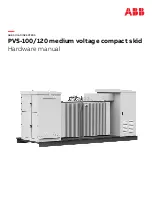
4. INSTALLATION
1. He position of Mounting
First ensure that there is enough space to install the inverter, while the installation
location must meet the following requirements:
(1) Drying: Do not use water or other liquids dripping on the inverter
(2) Cool: a working environment temperature of the product is 0-40
℃
, preferably a
temperature of 10-25
℃
, at a temperature as low as possible within this range
(3) Ventilation: There should be a certain distance between inverter and other objects,
to avoid blocking the products vents.
(4) Clean: Do install the products in the dusty, wood chips or other particles , If cooling
fan is turned on, the particles involved in the inside of the product, thus affecting the
normal work.
(5) While inverters and batteries connected, will produce arcs or sparks, so there
should not be around flammable objects such as gasoline, alcohol, etc.
2. Assemble the inverter
For this big power inverter, because of the heavier weight, preferably mounted on a
solid platform, such as floor, table or mounting bracket fine. In order to avoid falling off,
platform for supporting the product should can bear the weight of sufficient capacity,
and it is good with four screws to secure the product.
Note:
In case not connected to the remote box, the product can also be used as a
normal modified sine wave inverter as normal.
5. USING TIME OF BATTERY
1. Current and voltage:
The battery is used to supply the DC input voltage required by the product, and its
rated voltage must be in line with the rated input voltage of the inverter, beyond the
input voltage range of the inverter, and the cross connection will cause the product to
be under voltage or under voltage protection.
At the same time, the battery must provide enough current for inverter, a small capacity
battery is not able to drive high power appliances, in this case, usually due to excessive
current and battery discharge the battery terminal voltage low, undervoltage protection
products appear
The simple formula for the battery current is the load power / the battery voltage. As the
inverter itself will be part of the loss, so the actual current will be greater than this value
of about 10%. For example: the battery voltage is 12VDC, the load power is 400W, then
the actual current size of the battery is about 400W/12Vx110%=37A
2. Battery working time
The using time of battery depends on battery capacity (AH) and the power of the
connected load (W), the calculating method is: Time (hours) =battery capacity (AH) x
battery output voltage (V) x efficiency rate ÷ electrical power of using (W) such as
the12V DC input inverter uses the 12V battery, if the battery capacity is 200AH and at
this time the inverter is driving 400W power load, the efficiency rate is 90% when the
Remote control box:
Positive of DC
input (+)
Negative of DC
input (-)
Fan
AC
output
socket
Input Voltage
Indicator ( V )
Output Power
Indicator ( Kw ) Output Power
Indicator ( W )
Input Voltage And
Output Power Digital
Display
Remote Control
Interface
Normal working indicator
Remote interface
Connecting wire
Fault indicator
Power switch
(Switch)
4
5
























